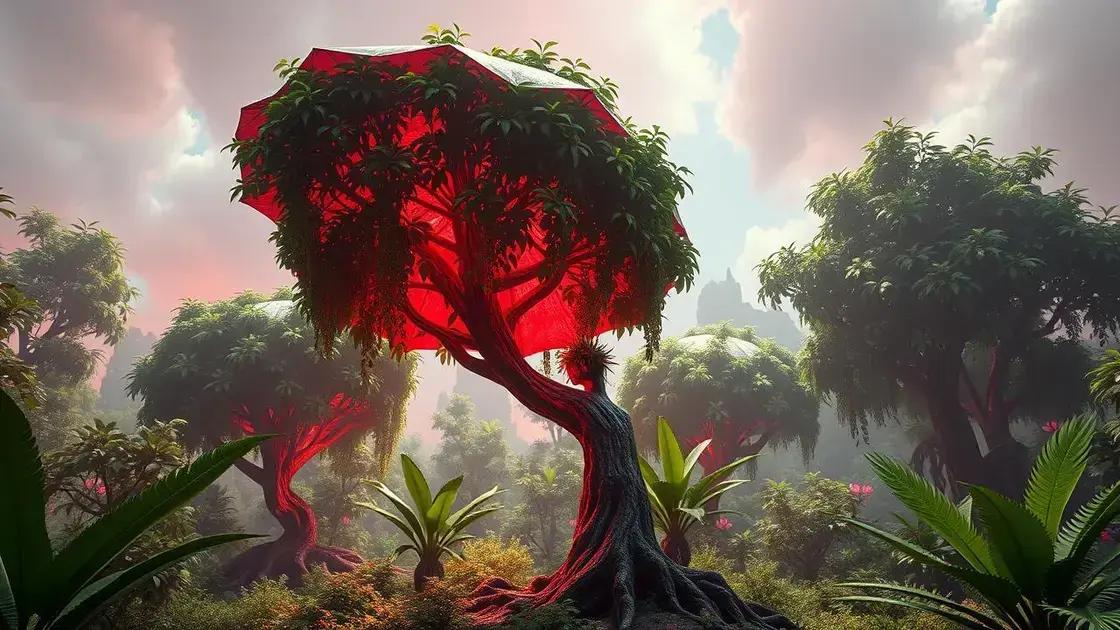How to Care for an Umbrella Tree Plant: 7 Essential Tips for Thriving Growth
How to care for an umbrella tree plant involves more than just watering. These beautiful houseplants can thrive with the right attention and knowledge. Whether you’re curious about the best sunlight or watering techniques, this guide will navigate you through essential care practices to ensure your Schefflera flourishes and adds vibrant greenery to your space.
Table of Contents
ToggleUnderstanding the Basics of Umbrella Tree Care
How to care for an umbrella tree plant starts with understanding its basic requirements. These vibrant indoor plants are not only visually appealing but also relatively easy to maintain when you know what they need. Let’s explore key aspects of umbrella tree care to help your Schefflera thrive.
- Light: Umbrella trees prefer bright, indirect light but can tolerate lower light conditions. Place them near windows that filter sunlight for the healthiest growth.
- Soil: Use well-draining potting soil. A mix designed for indoor plants is often ideal.
- Watering: Allow the top inch of soil to dry out before watering. Overwatering can lead to root rot, affecting your umbrella tree’s health.
Common environmental conditions for umbrella tree care
To optimize the care for an umbrella tree plant, consider the following environmental factors:
| Condition | Optimal Level |
|---|---|
| Humidity | 40-60% |
| Temperature | 65-80°F (18-27°C) |
| Light | Bright, indirect |
Signs of a healthy umbrella tree
When well cared for, an umbrella tree exhibits:
- Lush, green leaves
- Stable growth
- No significant leaf drop
By understanding these basic requirements and maintaining appropriate conditions, you’ll ensure your Schefflera remains a striking addition to your home. For more on exploring indoor gardening techniques, check out additional resources. With the right attention, your umbrella tree can flourish for years!
Watering Techniques for Your Umbrella Tree

Watering techniques for your umbrella tree play a crucial role in its health and growth. To keep your Schefflera vibrant, understanding how and when to water is essential. Let’s dive into effective watering practices to ensure your umbrella tree thrives.
Understanding the watering needs
Knowing how much water your umbrella tree requires can prevent common issues:
- Underwatering can lead to droopy leaves and stunted growth.
- Overwatering is a frequent cause of root rot.
Best practices for watering
Follow these steps for effective watering:
- Check soil moisture: Use your finger to poke about 1 inch into the soil. If it feels dry, it’s time to water.
- Water thoroughly: Ensure the water reaches the root zone. Water until it drains from the bottom of the pot.
- Adjust based on environment: In warmer, drier weather, you may need to water more frequently. During cooler months, reduce watering to avoid soggy soil.
How to manage humidity levels
Umbrella trees appreciate a bit of humidity in their environment. Here are some tips:
- Mist the leaves occasionally, especially in dry seasons.
- Use a humidity tray filled with water and pebbles beneath the pot, allowing the air around the plant to stay moist.
Implementing these watering techniques for your umbrella tree can significantly impact its growth and overall appearance. For extra tips and ideas, consider exploring indoor gardening techniques. By nurturing your Schefflera properly, you can enjoy a lush, healthy houseplant.
Common Pests and Diseases Affecting Schefflera
Common pests and diseases affecting Schefflera can significantly impact the health of your umbrella tree plant. Being able to identify and manage these issues is crucial for ensuring your plant remains vibrant and lush. Let’s explore some typical problems that may arise and how to address them.
Identifying common pests
A variety of pests can plague your Schefflera, resulting in damage if not treated promptly:
- Spider mites: These tiny pests thrive in dry conditions and suck sap from leaves, leading to stippling.
- Scale insects: These small, round bugs adhere to stems and leaves, causing yellowing and dropping of foliage.
- Mealybugs: Resembling small cotton balls, they excrete a sticky substance that can lead to sooty mold.
Recognizing diseases in umbrella trees
Several diseases can also affect the health of your umbrella tree:
- Root rot: Often caused by overwatering, this disease leads to a foul smell and mushy roots.
- Leaf spot: Fungal infections can create brown spots on leaves, which may spread if left untreated.
- Powdery mildew: A white powdery mold on leaves, indicating high humidity and poor air circulation.
Effective management and treatment strategies
To keep your Schefflera healthy and free from pests and diseases, consider these management techniques:
- Regularly inspect your plant for signs of pests or disease.
- Maintain proper watering practices to prevent root rot.
- Use insecticidal soap or neem oil for pest control.
- Improve air circulation around the plant to reduce humidity-related diseases.
By understanding the common pests and diseases affecting Schefflera, you can take proactive steps to protect your umbrella tree. For further insights and techniques, don’t hesitate to explore indoor gardening techniques that ensure a flourishing indoor garden.
In conclusion
Caring for an umbrella tree plant is a rewarding journey that involves understanding its basic needs, proper watering techniques, and identifying common pests and diseases. By applying the knowledge gained from this guide, you can ensure your Schefflera thrives in your indoor garden. Remember, consistent care and attention to its environmental conditions will lead to healthy growth. For additional insights, check out these tips on enhancing your indoor garden and create a vibrant home for your plants!

